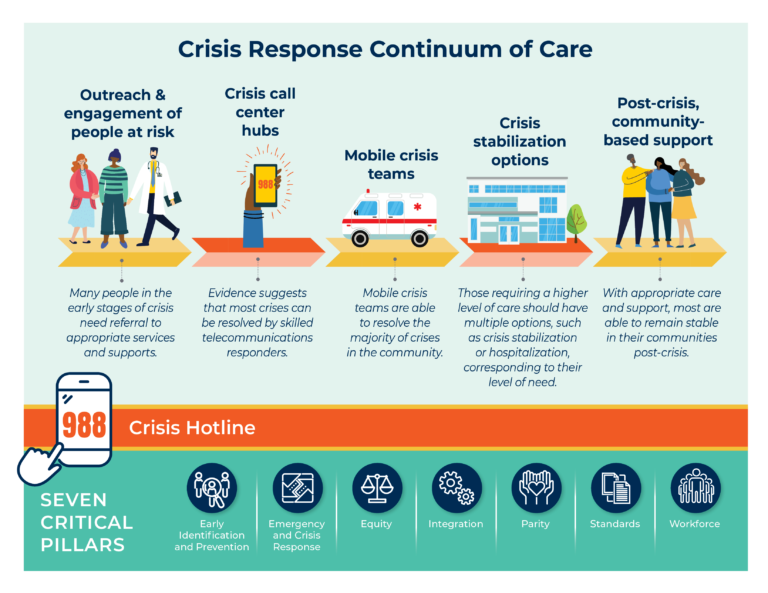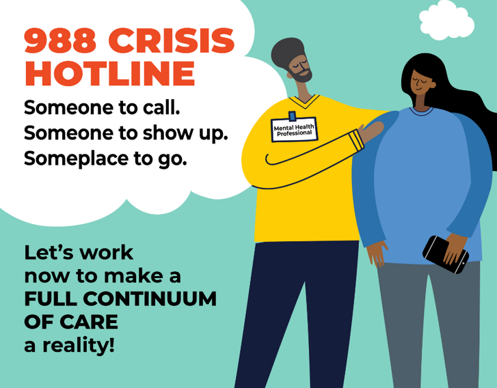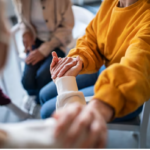Read our latest blog from Tyler Norris, Chief Executive, Well Being Trust

As local systems are built out, 988 will help ensure that anyone in crisis or contemplating suicide can receive help, not handcuffs. Jail or the emergency department is the wrong answer for a person struggling with a mental health crisis. We’ve seen time and again the “criminalization” of mental illness, when people who are suffering are treated as criminals because our systems are not equipped to respond appropriately. In fact, people with untreated mental illnesses are 16 times more likely to be killed during a police encounter. This must change; we’re optimistic that 988 is a bold step forward.
But for this to be the transformational moment it needs to be, communities must come together in deep commitment and make the necessary investments. Launching a phone number alone is not enough. 988 will only succeed if we come together — local governments, communities, philanthropies, mental health providers — to enact a shared framework of a harm-reduction centered around: (1) contact centers, (2) mobile response, and (3) stabilization centers in responding to mental health, substance misuse and suicidal crises.
What’s required is a comprehensive crisis response system that can support our community members throughout every stage of their mental health journeys — from prevention to recovery.
My colleague Dr. Benjamin Miller, president of Well Being Trust, reminds us: “The 988 line has the potential to create new pathways for care and a system that is responsive to communities’ needs. But without robust financing, clear communication, and strong leadership, the consequences of not getting 988 right are severe, and lives may be lost.”

A Continuum of Care: From Prevention to Crisis Response
In early 2020, Well Being Trust partnered with the leaders of 15 other leading mental health organizations to form the CEO Alliance for Mental Health in order to achieve a common goal: improve the lives of people with mental health and substance abuse disorders. I am honored to co-convene this group with Dan Gillison, the CEO of NAMI, and witness the power of more than 60 organizations now aligning around one Unified Vision for Transforming Mental Health and Substance Use Care.
At the CEO Alliance, we view the launch of 988 as a pivotal opportunity to transform how we prevent and respond to mental and behavioral health crises. Seeing it in this light, as so much more than a phone number, is absolutely critical to its success. That’s why in the fall of 2021, the CEO Alliance for Mental Health developed A Consensus Approach and Recommendations for the Creation of a Comprehensive Crisis Response System, an evidence-based toolkit to help elected officials, policymakers and advocates prepare for and make the most of the launch of 988.
The toolkit consists of seven pillars to create a full continuum of care, ensuring the success of 988 and the health and safety of the most vulnerable people in our communities.
Pillar 1: Early Identification and Prevention
Crisis support begins long before an emergency occurs. Early identification and prevention are crucial, but they’re often disregarded. Communities must invest in research, public education campaigns, screenings, and more to help and support people struggling with mental health.
Pillar 2: Emergency Crisis Response
To move away from law enforcement and toward public health and mental health programs, we must invest in emergency crisis centers, care facilities, and call center staff.
Pillar 3: Equity
We cannot help those with lived experience or from underserved communities if we do not include them in the planning process. We commit to promoting equity and inclusion, such as funding a diverse workforce and investing in multilingual education campaigns.
Pillar 4: Integration
First responders like police and EMS are critical and want to do their best by their communities. We need to support them in responding to mental health emergencies in effective ways. We can start with training, partnership and coordination between law enforcement and medical and mental health programs and staff.
Pillar 5: Parity
We believe in fair insurance coverage for mental health for all members of our communities, at a level equivalent to what we provide for physical health. Mental health parity is required by law but is unfortunately not well implemented or enforced. Doing so will prevent many from escalating to crisis or relapsing after re-entering society.
Pillar 6: Standards for Care
We fail our community members if we do not start by improving the quality of mental health treatment. We must invest in infrastructure, evidence-based treatments, and more.
Pillar 7: Workforce Capacity
Our vigilant mental health professionals are already stretched thin. In addition to addressing inadequate pay, we must raise up the necessary workforce to establish a thriving mental health infrastructure.
Change is Possible
Across the U.S., programs that take a similar approach to mental health crisis response are already transforming communities:
In Denver, the City Council invested $1.4 million to expand its Support Team Assisted Response (STAR) Program, which sends licensed mental health professionals along with an EMT or paramedic to appropriate emergency calls instead of police. Since launching in 2020, the program has been involved in more than 2,700 mental health and substance abuse incidents.
And in Maricopa County, Arizona, the police department diverts applicable calls to the Crisis Response Network (CRN), a nonprofit that runs crisis call centers. When necessary, CRN pairs mental health crisis teams (MCTs) with officers, showing how both teams can work together to best serve the community. CRN reports around 15,000 crisis calls and 1,400 MCT dispatches per month.
The Role of Philanthropy
It’s clear that the success of 988 hinges on deep collaboration between communities and the federal and local governments. SAMHSA has committed nearly $105 million to strengthen the crisis response infrastructure at the local level. But philanthropies play a role as well. In the 1970s, 911 grew to become the epitome of emergency response after the Robert Wood Johnson Foundation donated $15 million to expand the program. Philanthropies now have another opportunity to make a historical difference in how we address mental health. Philanthropy’s role is to ask, “What is the continuum of care in a community for someone in crisis? And how does a community invest in that and build that out?”
Philanthropies and impact investors can support 988 by funding:
- Federal and state call centers;
- Programs and federal oversight to identify gaps in 988 regulations;
- Research for evidence-based interventions and crisis responses;
- Initiatives to evaluate the success of 988 and improve it;
- Public awareness campaigns, especially in underserved communities.
Well Being Trust and partners are envisioning and investing in a robust care continuum that starts with prevention and early intervention; and helps to ensure that an individual’s worst day doesn’t negatively impact the rest of their life.
Lives are in the balance; we cannot afford to fail.
Join us in taking the necessary steps to help ensure the transformative potential of 988 is realized.
Learn more about the CEO Alliance for Mental Health the 988 Readiness Plan.
IMPORTANT: 988 is not yet fully active across the United States. If you or someone you know is in crisis now, call 1-800-273-8255 to be connected to the National Suicide Prevention Lifeline or reach out to the Crisis Text Line by texting ‘HOME’ to 741741.






